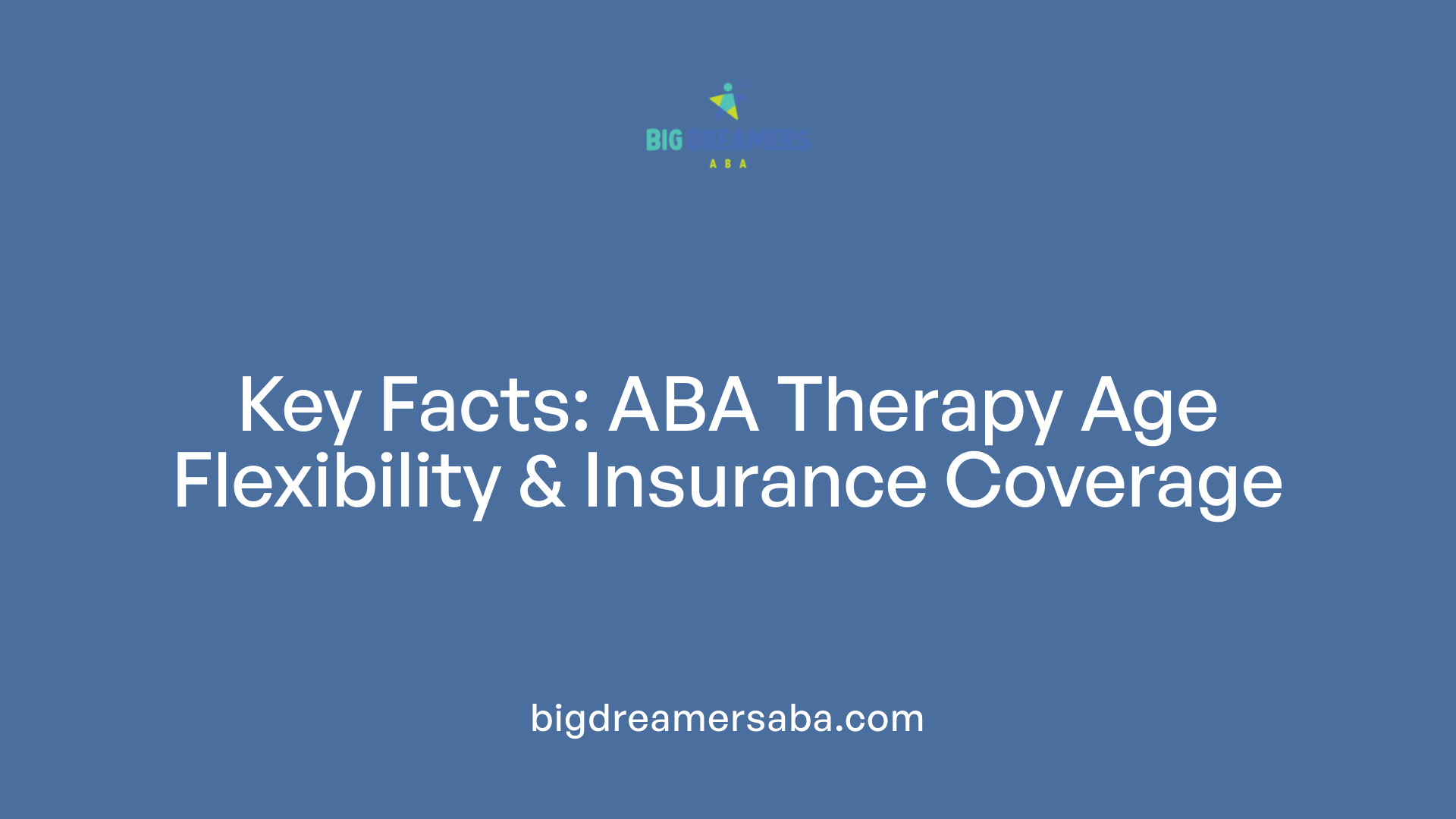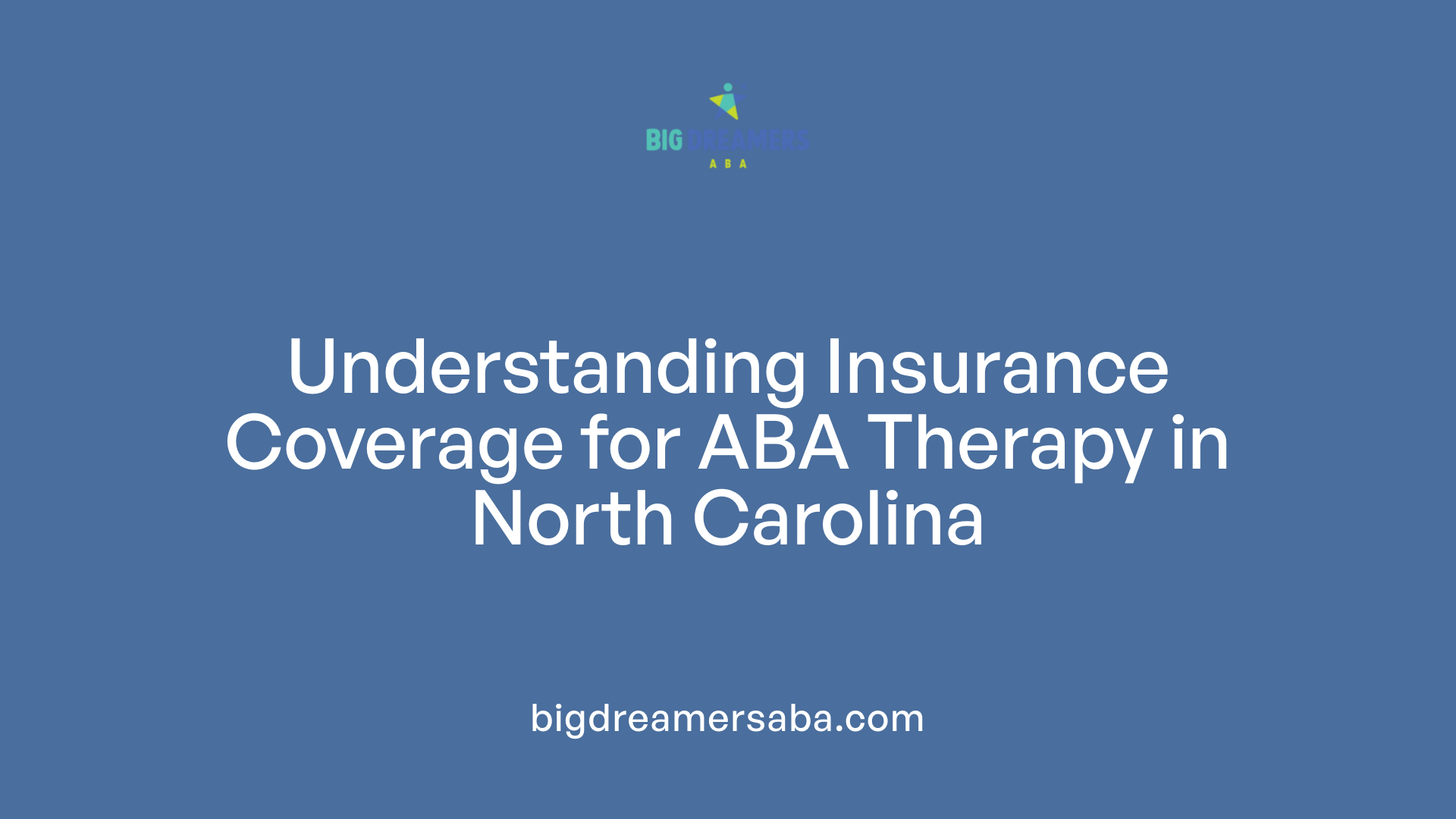What Is The Age Limit For ABA Therapy In North Carolina?
Navigating Age and Coverage for ABA Therapy in North Carolina

Understanding the Scope of ABA Therapy Age Limits in North Carolina
Navigating the age limits and insurance coverage for Applied Behavior Analysis (ABA) therapy can be a complex task for families in North Carolina, especially those with children diagnosed with Autism Spectrum Disorder (ASD). With its potential to significantly aid in the development of both children and adults on the autism spectrum, understanding the nuances of ABA therapy’s coverage and eligibility criteria in North Carolina is imperative. Here we delve into the specifics, from age-associated guidelines to the impact of state regulations and insurance mandates on accessing these essential services.
Key Facts on ABA Therapy Age Flexibility and Insurance in North Carolina

- No age limit for ABA therapy initiation or continuation exists in North Carolina.
- Insurance covers ABA therapy for individuals under 19, capping at $40,000 annually.
- Adults can also benefit from ABA therapy, with programs tailored for skill-building and independence.
- Medicaid provides coverage for beneficiaries under 21, enhancing access to necessary therapy.
- Early intervention with ABA therapy is crucial for infants and toddlers, promoting better long-term developmental outcomes.
- Therapy decisions hinge on individual progress, rather than fixed age limits, allowing for continued support.
- Challenges arise for adults over 19, as many insurance plans restrict coverage past this age.
- Recommended therapy frequency for young children ranges from 20 to 40 hours per week to maximize effectiveness.
- Family involvement in therapy is critical for creating a supportive learning environment beyond sessions.
- ABA therapy's continuation is based on developmental milestones and individual goals, with reevaluation from professionals.
The Age Flexibility of ABA Therapy

Is there an age limit for ABA therapy in North Carolina?
In North Carolina, there is no specific age limit for initiating or continuing ABA (Applied Behavior Analysis) therapy. This flexibility allows individuals of all ages—from infants to adults—to benefit from these vital services. The approach to therapy is uniquely tailored to an individual’s developmental stage and personal needs, focusing on enhancing life quality through skill development and behavior management.
While the state insurance mandates provide coverage for ABA therapy primarily for those under 19 years of age, with a cap of $40,000 annually, the absence of a rigid cut-off allows for therapy that can extend into adulthood. This means the decision to continue treatment is based on individual progress and evolving needs rather than an absolute age limit.
Can adults benefit from ABA therapy?
Absolutely! ABA therapy is effective for adults as well as children. Although it is commonly associated with early childhood interventions, adults with autism or related developmental challenges can also gain significant advantages from ABA principles.
Programs like those offered by Discovery ABA in Charlotte highlight how adult services can focus on skill-building aimed at fostering independence. Through targeted interventions, adults can improve crucial skills such as communication and social interactions, which significantly enhance their quality of life.
These programs often employ evidence-based methods to address specific challenges pertinent to adult life, thus making ABA a versatile approach that supports personal growth across all ages.
Ultimately, the age applicability of ABA therapy in North Carolina underscores its importance as a continuous support mechanism, tailored to the needs of each individual, regardless of their age.
Insurance Coverage and Age Limits: A Critical Overview

What are the insurance coverage guidelines for ABA therapy in North Carolina?
In North Carolina, the insurance coverage for Applied Behavior Analysis (ABA) therapy is governed by state law, specifically the Autism Health Insurance Coverage Law (HB 498) and Senate Bill 676. Under these regulations:
- Coverage Age Limit: Insurance plans must cover ABA therapy for individuals diagnosed with autism up to 18 years old. After reaching this age, families may face challenges in securing ongoing coverage.
- Annual Coverage Cap: The maximum annual coverage for ABA therapy is capped at $40,000 for each child under 19. This limitation significantly affects access to necessary therapy services, particularly for families needing extensive ongoing therapy.
- Medicaid Provision: The federal Medicaid program expands these guidelines by providing coverage for Medicaid beneficiaries under the age of 21, given that the therapy is medically necessary and prescribed by a qualified clinician.
How do these guidelines affect access to therapy based on age?
The age-related insurance guidelines have a profound impact on how families in North Carolina access ABA therapy services. Key points include:
- Early Intervention Encouraged: There is a strong emphasis on early intervention services, with ABA therapy available for infants and toddlers up to the age of 3. This is critical as early treatment is associated with better long-term outcomes.
- Access for Preschoolers: Preschoolers aged 3 to 5 benefit from early intervention ABA therapy that focuses on enhancing development and preparing for school integration.
- Ongoing Therapy Decisions: While there is no strict age limit for starting ABA therapy, decisions regarding continued therapy are based on individual progress and needs rather than a defined age cut-off. This flexibility allows some children and young adults to receive considerable help through their late teens.
- Challenges for Youth Over 19: Once individuals turn 19, access to funded ABA therapy becomes more restricted. Many insurance plans limit coverage to those under 19, meaning adults may have to seek alternative funding options or services.
Coverage Summary Table
North Carolina’s approach highlights the importance of tailoring services to diverse age groups, while also advocating for proactive measures in early developmental stages.
Early Intervention: Encouragement for Infants and Toddlers

How does early intervention with ABA therapy benefit young children?
Early intervention with Applied Behavior Analysis (ABA) therapy plays a crucial role in supporting infants and toddlers, particularly those identified with Autism Spectrum Disorder (ASD) or other developmental concerns. Research has shown that engaging in ABA therapy at a young age significantly enhances developmental outcomes across various domains.
ABA therapy focuses on improving key skills such as communication, social interactions, and adaptive behaviors while reducing challenging behaviors. This tailored approach helps children develop essential life skills, ensuring they are better prepared for future educational experiences.
For infants and toddlers up to 3 years old, the goal of early intervention is to address developmental concerns comprehensively. Evidence suggests that when therapy is initiated in the early years, children exhibit improved cognitive and social skills, often leading to better performance in later developmental stages. The earlier the support, the more effective the outcomes tend to be, highlighting the importance of timely access to ABA services.
What are the recommended practices for early intervention in North Carolina?
In North Carolina, early intervention practices are structured to optimize the effectiveness of ABA therapy for young children. Guidance emphasizes the necessity of individualized treatment plans, carefully crafted to meet each child’s specific needs. This personalized approach is vital, as it recognizes the unique progress and requirements of different children.
Key recommended practices include:
- Assessment and Documentation: Ongoing evaluations are crucial to monitor each child's progress and needs, allowing for timely adjustments to therapeutic approaches.
- Targeted Frequency: Young children, especially between 2 to 6 years of age, are encouraged to participate in 20 to 40 hours of therapy per week, depending on individual goals.
- Inclusive Family Involvement: Families are encouraged to engage in the therapeutic process, fostering a supportive environment that extends learning beyond therapy sessions.
North Carolina's guidelines mandate that qualified professionals, including board-certified behavior analysts (BCBAs), deliver ABA services. By adhering to this structured approach, early intervention can effectively support infants and toddlers in achieving their developmental milestones and setting the stage for future success.
Summary Table of Early Intervention Practices in North Carolina
Evaluating Continued Therapy: Case-by-Case Basis

When should ABA therapy be continued or stopped?
Determining when to continue or stop ABA therapy is highly individualized. Parents and caregivers should closely monitor the child's progress and consult with professionals regarding developments in communication, social skills, and behavior modification.
Therapy may be considered for discontinuation once a child reaches key developmental goals or experiences a plateau in progress. Typically, ABA therapy may last anywhere from three to five years for children, but this can vary widely depending on individual needs and circumstances.
What factors influence the continuation of therapy?
Several factors play a vital role in deciding whether to continue ABA therapy:
- Developmental Progress: Significant improvements in communication, social skills, and behavior indicate that therapy may no longer be necessary.
- Individualized Goals: The specifics of the objectives set for each child will influence the length of therapy. When these goals are reached, therapy can be reassessed.
- Frequency of Sessions: Children typically receive between 10 to 30 hours of therapy weekly. A gradual reduction in hours can help transition the child to independence effectively.
- Parental Insights: Families' observations on their child's skills and independence similarly inform the therapy's cessation.
Monitoring and Decision-Making
It is essential for parents to engage in ongoing conversations with therapists. Communication with professionals assists in formulating a personalized assessment regarding the continuation of ABA therapy. Each child’s development and readiness for independence is unique, and utilizing a case-by-case approach ensures that decisions are made in the child’s best interest, fostering sustained growth and development.
ABA therapy can greatly enhance various skills, making it imperative to evaluate its necessity based on each child's specific journey.
Conclusion: The Path Forward with ABA Therapy in North Carolina
While the guidelines and regulations surrounding ABA therapy in North Carolina might seem stringent, they are designed to ensure that individuals with autism receive the support they need at critical developmental stages. Although there is a seeming age limitation in terms of insurance coverage, the therapeutic benefits extend over a lifetime, offering invaluable support to those who need it. Early intervention plays a notably critical role, setting the groundwork for long-term development and independence. Understanding when to commence and conclude therapy based on individual progress is equally crucial, necessitating ongoing communication between families and professionals. As policies evolve and awareness grows, the hope remains that ABA therapy can continually adapt to serve each individual holistically, beyond the confines of age.
References
- What Is the Age Limit for ABA Therapy in North Carolina?
- What Is The Age Limit For ABA Therapy In North Carolina?
- What Is The Age Limit For ABA Therapy In North Carolina?
- What Is The Age Limit For ABA Therapy In North Carolina?
- Age Limit for ABA Therapy in North Carolina: Unveiling the Guidelines
- NCDHHS Insurance Coverage for ABA Therapy
- What Is The Age Limit For ABA Therapy In North Carolina?
- ABA Therapy and Insurance in North Carolina
Recent articles

How ABA Therapy Can Help Improve Focus and Attention in Children

Why ABA Therapy is the Gold Standard for Autism Treatment
